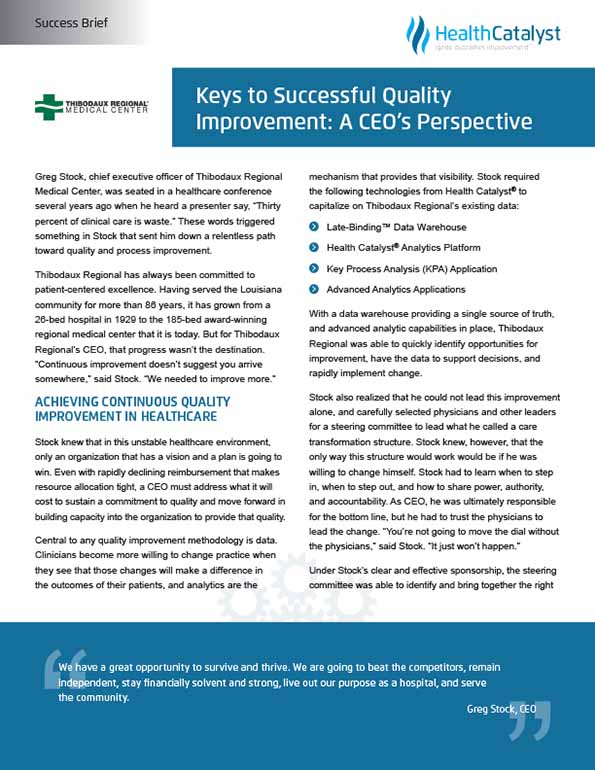The healthcare landscape is shifting rapidly, calling on leaders to create an environment that prioritizes transparent communication and continuous learning to improve quality. Addressing inefficiencies opens the door for meaningful, transformative leadership. By engaging key stakeholders and implementing data-driven practices, healthcare leaders can build a sustainable foundation for ongoing quality improvement within their organizations.
Greg Stock, chief executive officer of Thibodaux Regional Medical Center, was seated in a healthcare conference several years ago when he heard a presenter say, “Thirty percent of clinical care is waste.” These words triggered something in Stock that sent him down a relentless path toward quality and process improvement.
Thibodaux Regional has always been committed to patient-centered excellence. Having served the Louisiana community for more than 86 years, it has grown from a 26-bed hospital in 1929 to the 185-bed award-winning regional medical center that it is today. But for Thibodaux Regional’s CEO, that progress wasn’t the destination. “Continuous improvement doesn’t suggest you arrive somewhere,” said Stock. “We needed to improve more.”
Stock knew that in this unstable healthcare environment, only an organization that has a vision and a plan is going to win. Even with rapidly declining reimbursement that makes resource allocation tight, a CEO must address what it will cost to sustain a commitment to quality and move forward in building capacity into the organization to provide that quality.
Central to any quality improvement methodology is data. Clinicians become more willing to change practice when they see that those changes will make a difference in the outcomes of their patients, and analytics are the mechanism that provides that visibility. Stock required the following technologies from Health Catalyst to capitalize on Thibodaux Regional’s existing data:
With a data warehouse providing a single source of truth, and advanced analytic capabilities in place, Thibodaux Regional was able to quickly identify opportunities for improvement, have the data to support decisions, and rapidly implement change.
Stock also realized that he could not lead this improvement alone, and carefully selected physicians and other leaders for a steering committee to lead what he called a care transformation structure. Stock knew, however, that the only way this structure would work would be if he was willing to change himself. Stock had to learn when to step in, when to step out, and how to share power, authority, and accountability. As CEO, he was ultimately responsible for the bottom line, but he had to trust the physicians to lead the change. “You’re not going to move the dial without the physicians,” said Stock. “It just won’t happen.”
Under Stock’s clear and effective sponsorship, the steering committee was able to identify and bring together the right people to inspire a high level of physician engagement and clinical collaboration, forming highly effective improvement teams that could quickly and successfully implement and sustain outcome improvements.
Key to the success of the teams is the role of a program manager who knows how teams should function as well as how to get things done. Stock makes it a point to meet with the program manager weekly so that he can provide support in breaking down any barriers that the program manager’s teams encounter.
Once teams have gained experience on a particular project, Stock expects them to take the knowledge and skills they have acquired and apply them to other problem areas across the organization. And because quality improvement requires a continuous approach, rather than ignoring “completed” projects, leadership monitors those projects to ensure gains are not lost, and intervenes to hold people accountable if performance ever starts to slip.
The purpose of a hospital is to save lives, eliminate patient safety issues, and improve care, and Thibodaux Regional is accomplishing that mission on many fronts. Stock estimates that Thibodaux Regional is saving 16 lives per year through its sepsis improvement project alone.
Furthermore, Stock has seen quality advances with physician relationships as well as exciting leadership development of physicians across the organization. Additionally, the increase in institutional knowledge and skill related to quality improvement among physicians and staff is an investment that will serve the hospital and Thibodaux community well into the future.
Adding support and credibility to successful outcomes led by its CEO, Thibodaux has received numerous recognitions for its unwavering commitment to continuous quality improvement:
“This moment in healthcare is threatening to many, but it’s also exciting to those who see the opportunity,” summed up Stock. “What I am really encouraged about is positive change. Some of these things we have been trying to do for years, and now they are actually happening. And so, while we can say the environment is a negative and difficult one, out of that we are going to fashion something better and patients are going to benefit from it.”


